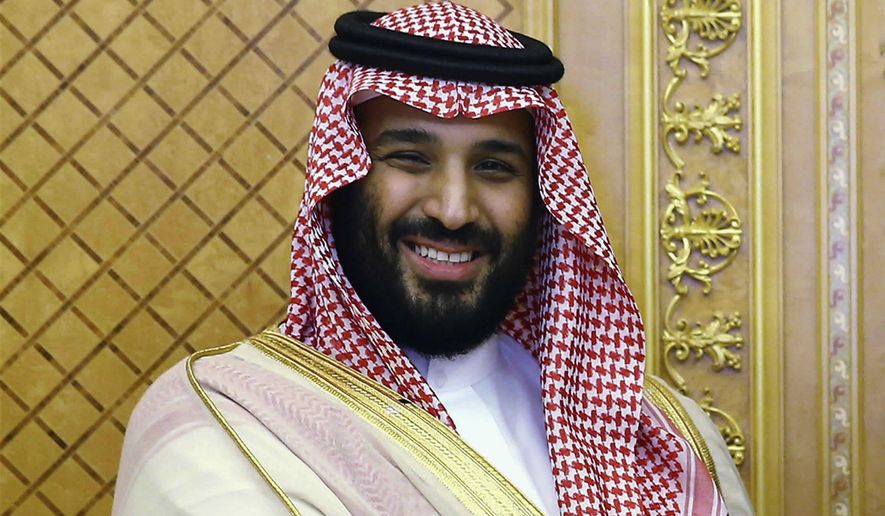Saudi Arabia’s hard-charging young crown prince, in the midst of a bare-knuckle overhaul of his country’s social, religious and economic profile while pushing an increasingly hard line against Iran, will make a momentous first visit to the White House next week.
With Riyadh emerging as a linchpin of U.S. policy in the region, President Trump will host 32-year-old Crown Prince Mohammed bin Salman on Tuesday to discuss strengthening the security relationship between Washington and Riyadh, part of a three-day U.S. visit for the prince.
For his part, the crown prince is eager to ensure that Mr. Trump, who broke with precedent to make Saudi Arabia the site of his first foreign visit of his presidency last year, continues to stand with the Kingdom on a range of fronts, including its controversial war against Iran-backed rebels in Yemen and its diplomatic campaign to isolate Qatar.
With Saudi King Salman bin Abdulaziz Al Saud appearing close to fully ceding power to his ambitious son, analysts say Mohammed will try to challenge U.S. perceptions that Saudi Arabia is an unsavory ally suffering from rampant corruption and practicing a severe version of Islam.
The prince, who made a three-day state visit to Britain this week, has emerged as a fierce but polarizing advocate of reforms — promoting a more moderate form of Islam, attacking royal corruption and economic overregulation, paving the way for women to drive, and even loosening restrictions on movie theaters. But many in the West remain wary.
“The iconic image for Americans when it comes to Saudi Arabia remains 9/11,” said Steven A. Cook, a senior fellow with the Council on Foreign Relations, noting that 15 of the 19 terrorists who carried out the 2001 attacks were of Saudi origin.
Speaking at an Arabia Foundation event this week, Mr. Cook said that “it’s going to take time and a lot of effort on the part of the Saudis” to get past the negative perceptions.
“I do think that they have a good story to tell now,” Mr. Cook said. “Internally there is a flicker of hope for the future of Saudi Arabia.”
Enter Mohammed, widely known simply as “MBS.”
The prince has garnered favorable reviews for his “Saudi Vision 2030” — a blueprint for social and economic modernization designed to diversify and modernize the world’s oil superpower in a new world of falling energy prices and rising competition.
But his impatient style has rankled many in his deeply conservative country, while raising doubts abroad about some of his more aggressive moves.
The prince played a central role in the Saudi military intervention in Yemen. While the U.S. government has supported Riyadh’s fight against Iran-backed Houthi rebels there, the Saudi-led bombing campaign has stalled while facing fierce criticism from rights groups for heavy civilian casualties and a humanitarian crisis in Yemen contributing to the worst cholera outbreak in history.
The prince also led the push among Sunni Arab states to isolate neighboring Qatar, a diplomatic offensive that has unnerved the Pentagon because Qatar plays host to the most strategic U.S. base in the region.
The prince is also widely credited — and blamed — for a major internal crackdown in Riyadh in November, featuring the arrest of dozens of top Saudi business leaders and royal family members, confined to a luxury hotel in the Saudi capital.
Most have since been released, but the prince said he remains committed to fighting the “cancer of corruption.” The extralegal detentions came just months after the prince ousted an older cousin from the crown prince spot last June.
The doubts are clouding another major Saudi priority — the partial sale of stock in the state-owned oil firm Saudi Aramco. New York and London are vying to manage the massive offering, but Reuters has reported that Western investor interest has been sapped by doubts about Saudi Arabia’s record on human rights and the rule of law.
Still, U.S.-Saudi bilateral ties are vastly improved under Mr. Trump compared to President Obama, who helped negotiate the Iran nuclear deal in the face of open opposition from Saudi Arabia and other Gulf states.
“The Saudi relationship with the Trump team is closer than with any president since George H.W. Bush and the liberation of Kuwait,” according to Bruce Riedel, a former CIA official who heads the Brookings Institution’s Intelligence Project.
In an article this week in Al-Monitor, Mr. Riedel said that the recent removal of the top-secret clearance for Jared Kushner, Mr. Trump’s son-in-law who was the prince’s “most valued interlocutor,” could also color the visit.
“The Saudi strategy toward America is built fundamentally on the Trump family connection, expensive lobbyists and Iran-bashing,” wrote Mr. Riedel. “The prince has little experience with the complexities of America’s politics, which are more complicated than ever in the Trump era.”
• Guy Taylor can be reached at gtaylor@washingtontimes.com.




Please read our comment policy before commenting.